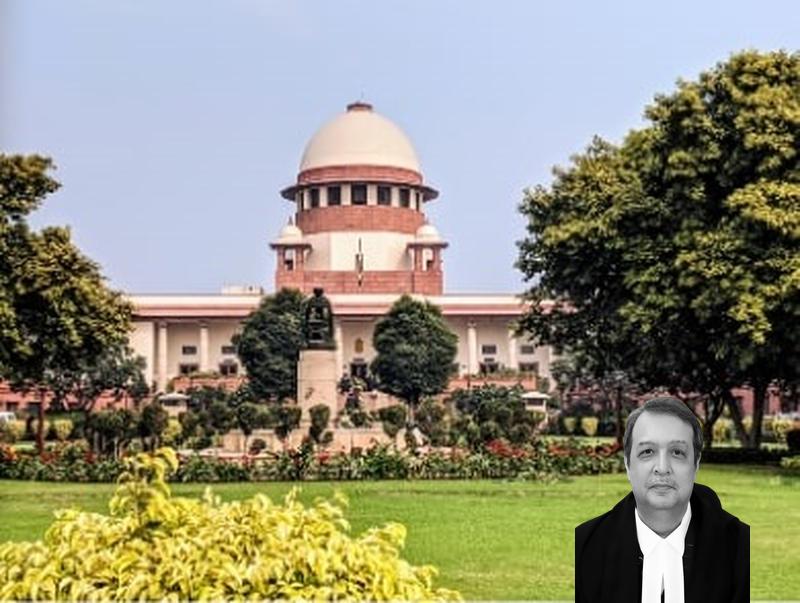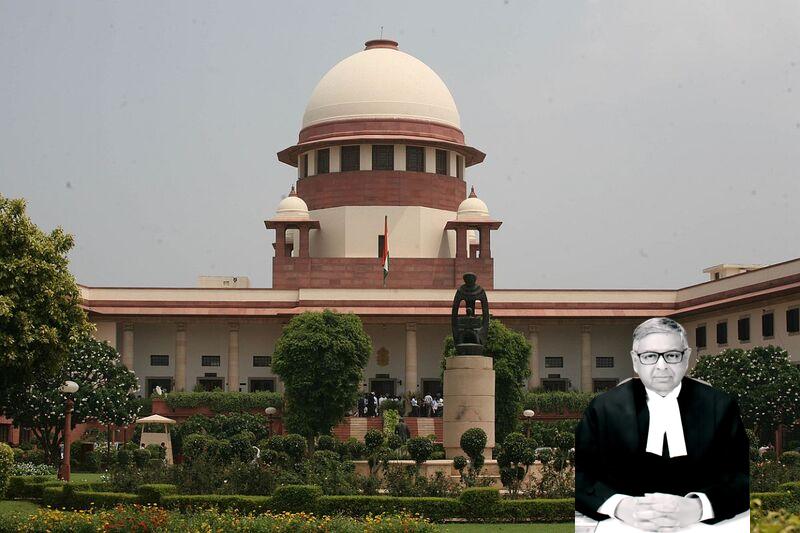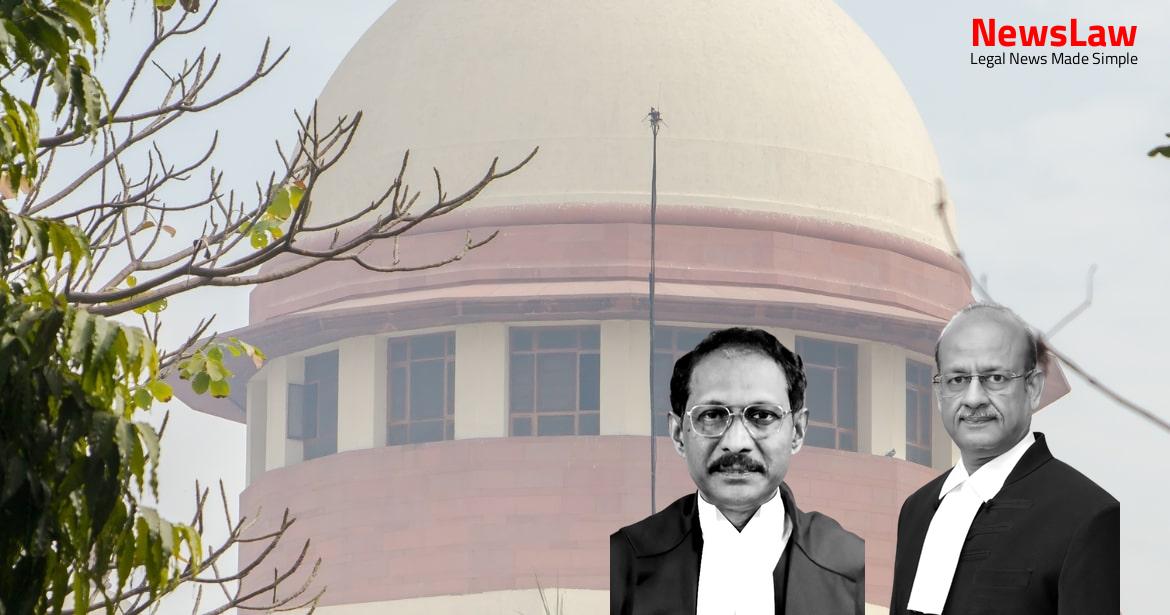The appellant herein (Original Accused No 2) at the relevant point of time was serving as an Assistant General Manager, State Bank of India, Overseas Bank (Bank), Hyderabad. He is also alleged to have approved the release of cash credit limit of Rs. It appears that by an order dated 13.02.2015, the Chief General Manager (MCG-I), SBI declined to accord sanction under Section 19 of the PC Act, 1988 to prosecute the appellant herein for the offences punishable under the PC Act, 1988.
A learned Single Judge of the High Court allowed the writ petition filed by the appellant herein holding that the sanctioning authority once having declined to accord sanction could not have taken its earlier order in review and granted fresh sanction to prosecute the appellant. The Intra-Court appeal filed by the CBI failed vide order dated 15.07.2019 and thereby the order passed by the learned Single Judge came to be affirmed. No 33279/16 dated:30.10.2018, the sanction proceedings issued against A2 for the offences under Section 13(2) r/w 13(1)(d) of PC Act are set aside and as such A2 is liable to be discharged for the said offence under 13(2) r/w 13(1)(d) of Prevention of Corruption Act, 1988. The High Court adjudicated the Criminal Petition
No 6782 of 2019, filed by the appellant herein and by its impugned order dated 20.06.2022 rejected the same. The defences taken by the petitioner herein cannot be considered in a petition filed under Section 482 of Cr.P.C. If it appeared on a reading of complaint and consideration of allegations therein, in light of the statement made on oath that the ingredients of the offence are disclosed, there would be no justification for High Court to interfere. However, as the subject Calendar Case is of the year 2015, the Special Judge for CBI Cases at Hyderabad, is directed to dispose of the said case (C.C.No.17 of 2015) in accordance with law within a period of three (3) months from the date of receipt of a copy of this order.” Ramakrishna Reddy, the learned counsel appearing for the appellant vehemently submitted that the sanction under Section 197 of the CrPC is mandatory to prosecute the appellant for the offences under Sections 120-B, 420, 468 and 471 respectively of the IPC.
In such circumstances referred to above, the learned counsel appearing for the appellant prayed that continuation of the criminal prosecution for the offences under the IPC would be nothing but a gross abuse of the process of law and would lead to serious miscarriage of justice. Aishwarya Bhati, the learned Additional Solicitor General (ASG) appearing for the CBI submitted that although the sanctioning authority declined to accord sanction under Section 19 of the PC Act, 1988 to prosecute the appellant for the offences punishable under the provisions of the PC Act, 1988 yet, that by itself is not sufficient to discharge the appellant even from the offences punishable under the IPC.
The learned ASG further submitted that the sanction required under Section 197 of the CrPC and the sanction required under the PC Act, 1988 stand on different footings whereas, sanction under the IPC in terms of the CrPC is required to be granted by the State or Central Government as the case may be; under the PC Act, 1988, it can be granted also by the authorities specified in Section 19 thereof. Bhati placed on record the letter dated 21.12.2014 addressed by the CBI to the Chief Vigilance Officer, State Bank of India, requesting for sanction under Section 19 of the PC Act, 1988.
Giridhar Goud (A-11), formerly worked as Executive- Accounts, M/s Jupiter Biosciences Ltd., Secunderabad, Shri Sunder Hari Prasad (A-12), formerly worked as Executive- Accounts, M/s Jupiter Biosciences Ltd, Secunderabad, Shri M. Chandra Murthy (A-14), formerly worked as Accounts Supervisor, M/s Jupiter Bioscience ltd., Hyderabad, Shri Shyam Sunder Suri (A-15), Proprietor, M/s V.R.
Srinivasa Reddy (A-2), Assistant General Manager, State Bank of India, Ananthpur Regional Office, Ananthpur, Andhra Pradesh and Shri Kuppa Srinivas (A-3), Chief Manager & Relationship Manager, State Bank of India, Anaparthi East, Godavari District, Andhra Pradesh, from the competent authority as mandated u/s 19(1)(c) of the Prevention of Corruption Act, 1988. of India, in case, any applicant seek copy of the CBI Report or part thereof under the RTI Act, 2005, the same may be refused.
Also Read: https://newslaw.in/?p=548
In order to prove the sanction for prosecution, it is requested that the name of the officer working under the sanctioning authority who is conversant with the case and can prove the signatures and application of mind by the sanctioning authority may be intimated to this office, to cite him as a witness. Sidharth Sangal, the learned counsel appearing for the Bank vehemently submitted that the application of the appellant, seeking discharge from the offences under the PC Act, 1988 has already been allowed, however, his application, seeking discharge from the offences under the IPC has been dismissed by order dated 26.07.2022 of the Ld. The appellant, was ultimately, given ‘Administrative Warning’ in respect of the charges against him which were levied for the appellant’s failure to discharge his duties with utmost devotion and diligence and acting in a manner unbecoming of a Bank Official and highly prejudicial to the Bank’s interest – the said charges were neither Sections 420, 468, 471 or 120-B of the IPC. It was submitted that a bare reading of Section 197 of the CrPC clearly indicates that the Section 197 of the CrPC is only applicable to those ‘public servants’ who are removable with the sanction of the Government and to no other ‘public servants’. Having heard the learned counsel appearing for the parties and having gone through the materials placed on record the following questions of law fall for our consideration: (i) Whether the appellant, serving in his capacity as an Assistant General Manager, State Bank of India, Overseas Bank, is removable from his office save by or with the sanction of the Government so as to make Section 197 of the CrPC applicable? — (1) When any person who is or was a Judge or Magistrate or a public servant not removable from his office save by or with the sanction of the Government is accused of any offence alleged to have been committed by him while acting or purporting to act in the discharge of his official duty, no Court shall take cognizance of such offence except with the previous sanction save as otherwise provided in the Lokpal and Lokayuktas Act, 2013 (1 of 2014)– (a) in the case of a person who is employed or, as the case may be, was at the time of commission of the alleged offence employed, in connection with the affairs of the Union, of the Central Government; (b) in the case of a person who is employed or, as the case may be, was at the time of commission of the alleged offence employed, in connection with the affairs of a State, of the State Government: Provided that where the alleged offence was committed by a person referred to in clause (b) during the period while a Proclamation issued under clause (1) of article 356 of the Constitution was in force in a State, clause (b) will apply as if for the expression “State Government” occurring therein, the expression (2) No Court shall take cognizance of any offence alleged to have been committed by any member of the Armed Forces of the Union while acting or purporting to act in the discharge of his official duty, except with the previous sanction of the Central Government. (3B)
Notwithstanding anything to the contrary contained in this Code or any other law, it is hereby declared that any sanction accorded by the State Government or any cognizance taken by a court upon such sanction, during the period commencing on the 20th day of August, 1991 and ending with the date immediately preceding the date on which the Code of Criminal Procedure (Amendment) Act, 1991 (43 of 1991), receives the assent of the President, with respect to an offence alleged to have been committed during the period while a Proclamation issued under clause (1) of article 356 of the Constitution was in force in the State, shall be invalid and it shall be competent for the Central Government in such matter to accord sanction and for the court to take cognizance thereon.
Section 197, as it now stands, applies to a public servant of the specified category only when he is holding office as such public servant. Sub-section (1) of Section 197 of the CrPC shows that sanction for prosecution is required where any person who is or was a Judge or Magistrate or a public servant not removable from his office save by or with the sanction of the Government is accused of any offence alleged to have been committed by him while acting or purporting to act in discharge of his official duty. The dictionary meaning of the word ‘sanction’ is as under:— “Webster’s Third New Internal Dictionary: Explicit permission or recognition by one in Authority that gives validity to the act of another person or body; something that authorizes, confirms, or countenances. The Law Lexicon by Ramanath Iyer: Prior approval or ratification.” In 78 Corpus Juris Secundum at Page 579 different meanings have been given to the word as a noun and as a verb. Section 216 of the CrPC gives power to the Court to alter or add to any charge at any time before judgment is pronounced but sub-section (5) thereof provides that if the offence stated in the altered or added charge is one for the prosecution of which previous sanction is necessary, the case shall not be proceeded with until such sanction is obtained, unless sanction has been already obtained for a prosecution on the same facts as those on which the altered or added charge is founded.
Although a person working in a Nationalised Bank is a public servant, yet the provisions of Section 197 of the CrPC would not be attracted at all as Section 197 is attracted only in cases where the public servant is such who is not removable from his service save by or with the sanction of the Government. This Court, while dismissing the appeal held that though a person working in a Nationalised Bank is a public servant, the provisions of Section 197 are not attracted at all. Prasad (supra) has been quoted with approval in a later decision in the case of S.K.
The appellant filed an application before the ACMM, Saket Court, New Delhi in the FIR referred to above, stating that he being a public servant employed with the Nationlised Bank as a Manager, it was mandatory to seek sanction against him in terms of Section 197 of the CrPC. The High Court in its impugned judgment has not adverted to the above aspect and has only confined to the discussion as to whether the acts alleged of the appellant were in discharge of official duty. Assuming for a moment that the appellant herein should be considered as a “public servant” for the IPC sanction also, the protection available under Section 197 of the CrPC is not available to the appellant herein since, the conditions in built under Section 197 of the CrPC are not fulfilled. It was vociferously argued by the learned counsel appearing for the appellant that as sanction under Section 19 of the PC Act, 1988 has not been granted, the appellant cannot not be prosecuted for the offences under the IPC alone and he should be discharged from the criminal proceedings. Provided further that in the case of request from the person other than a police officer or an officer of an investigation agency or other law enforcement authority, the appropriate Government or competent authority shall not accord sanction to prosecute a public servant without providing an opportunity of being heard to the concerned public servant: Provided also that the appropriate Government or any competent authority shall, after the receipt of the proposal requiring sanction for prosecution of a public servant under this sub-section, endeavour to convey the decision on such proposal within a period of three months from the date of its receipt: Provided also that in case where, for the purpose of grant of sanction for prosecution, legal consultation is required, such period may, for the reasons to be recorded in writing, be extended by a further period of one month: Provided also that the Central Government may, for the purpose of sanction for prosecution of a public servant, prescribe such guidelines as it considers necessary.
Also Read: https://newslaw.in/?p=554
(2) Where for any reason whatsoever any doubt arises as to whether the previous sanction as required under sub- section (1) should be given by the Central Government or the State Government or any other authority, such sanction shall be given by that Government or authority which would have been competent to remove the public servant from his office at the time when the offence was alleged to have been committed. Notwithstanding anything contained in the Code of Criminal Procedure, 1973 (2 of 1974), — (a) no finding, sentence or order passed by a special Judge shall be reversed or altered by a Court in appeal, confirmation or revision on the ground of the absence of, or any error, omission or irregularity in, the sanction required under sub- section (1), unless in the opinion of that court, a failure of justice has in fact been occasioned thereby; (b) no court shall stay the proceedings under this Act on the ground of any error, omission or irregularity in the sanction granted by the authority, unless it is satisfied that such error, omission or irregularity has resulted in a failure of justice; (c) no court shall stay the proceedings under this Act on any other ground and no court shall exercise the powers of revision in relation to any interlocutory order passed in any inquiry, trial, appeal or other proceedings.
What is important to consider is whether the offences for one reason or the other punishable under the IPC are also required to be approved in relation to the offences punishable under the PC Act, 1988. Parliament must have desired to maintain the distinction and hence the wording in the corresponding provision in the former PC Act was materially imported in the new PC Act, 1988 without any change in spite of the change made in Section 197 of the Code…” (Emphasis supplied) 57.
Case Title: A. SREENIVASA REDDY Vs. RAKESH SHARMA (2023 INSC 682)
Case Number: Crl.A. No.-002339-002339 / 2023



